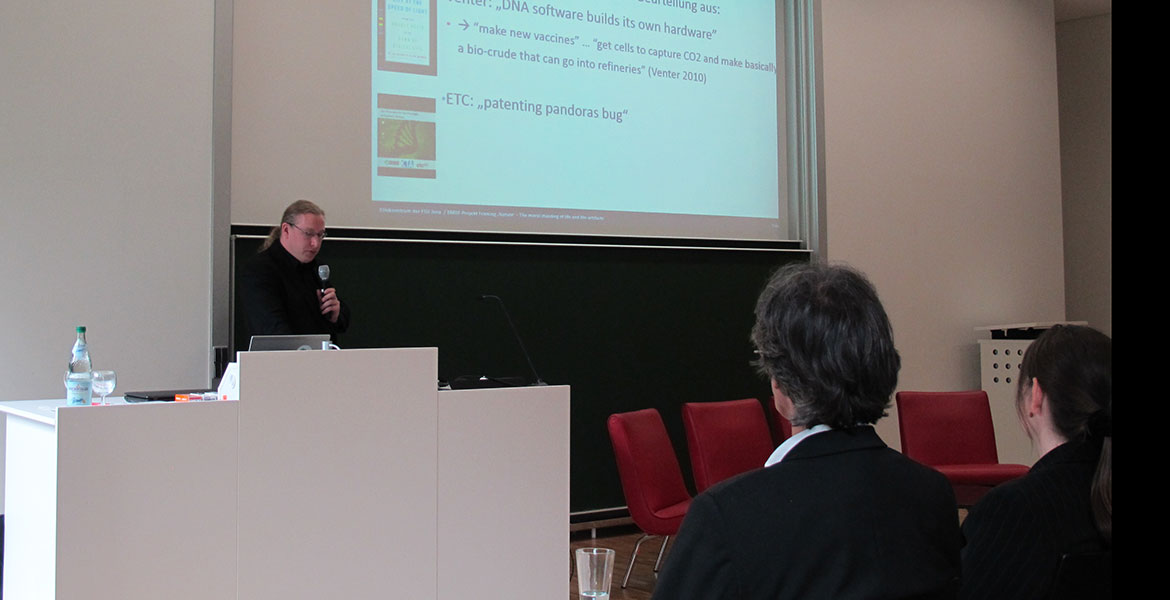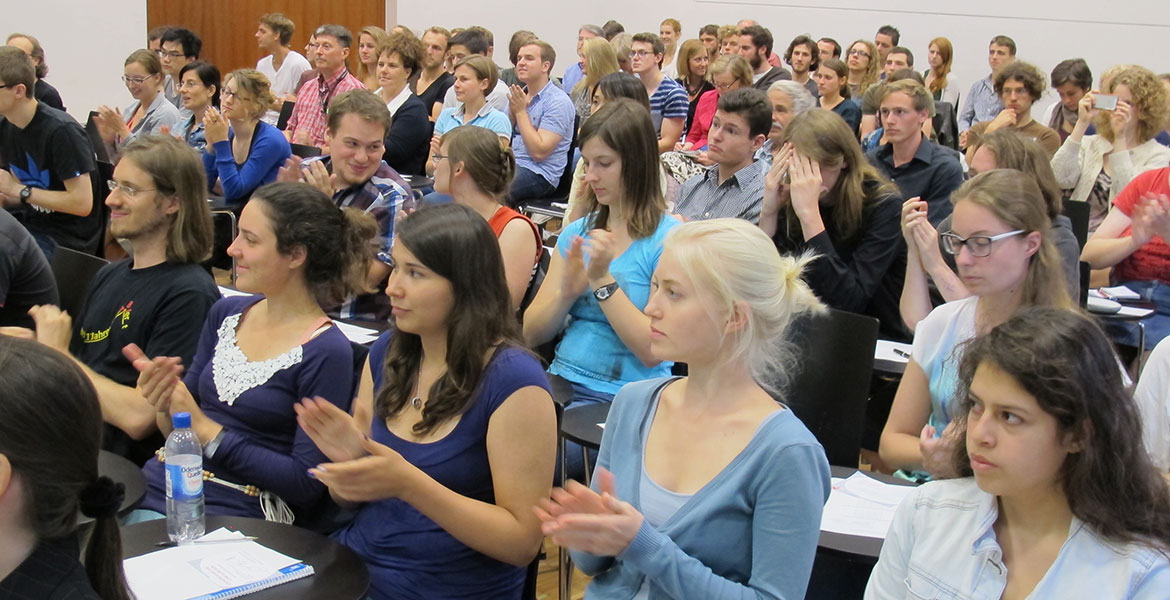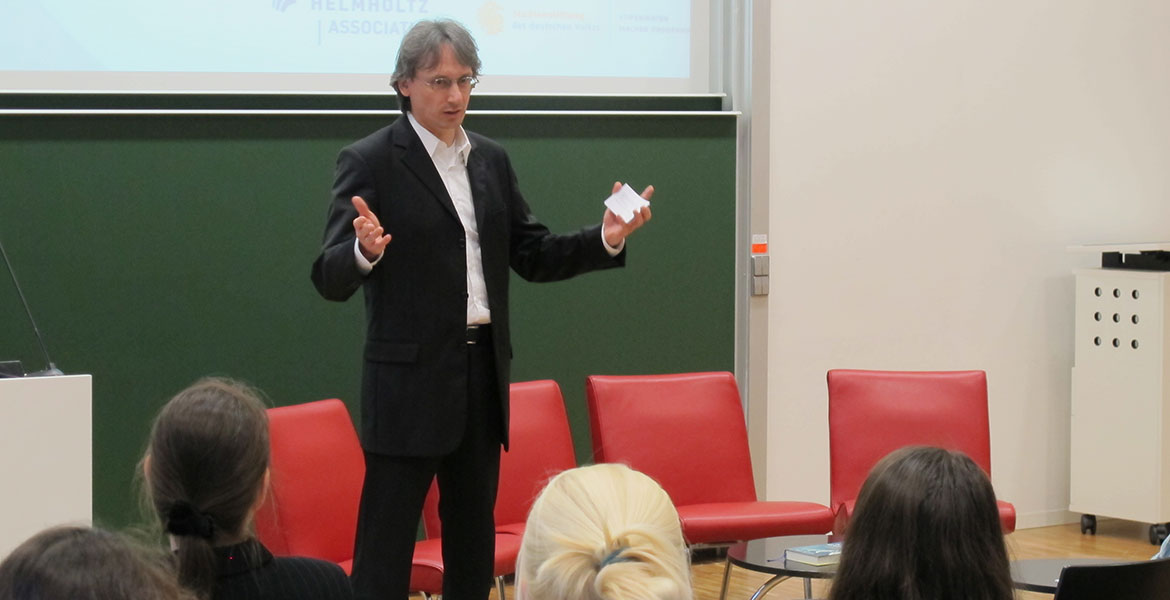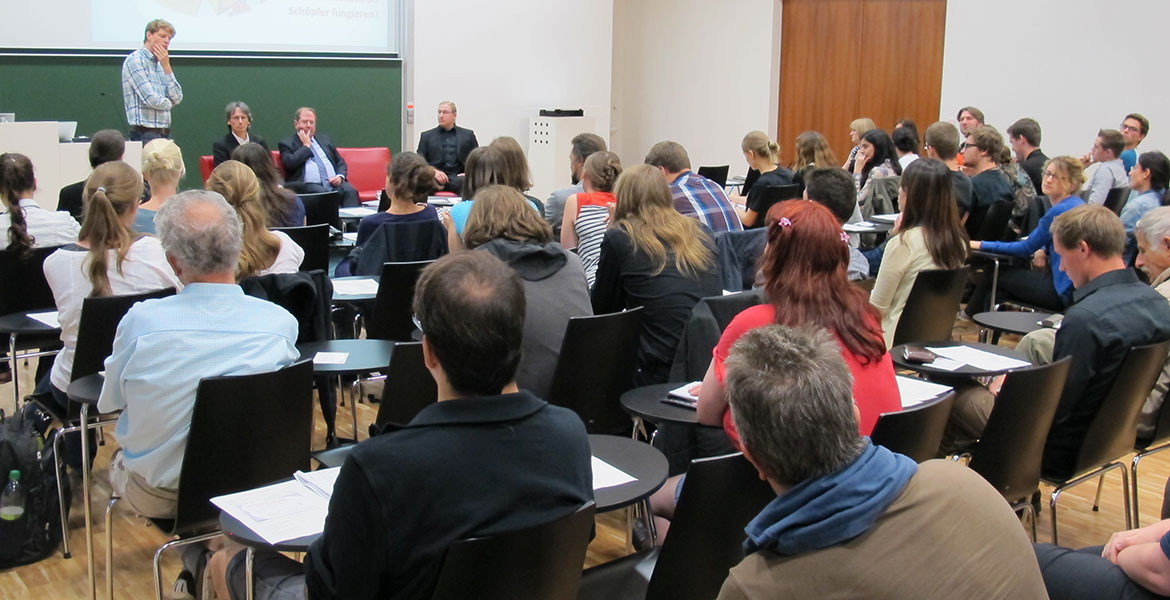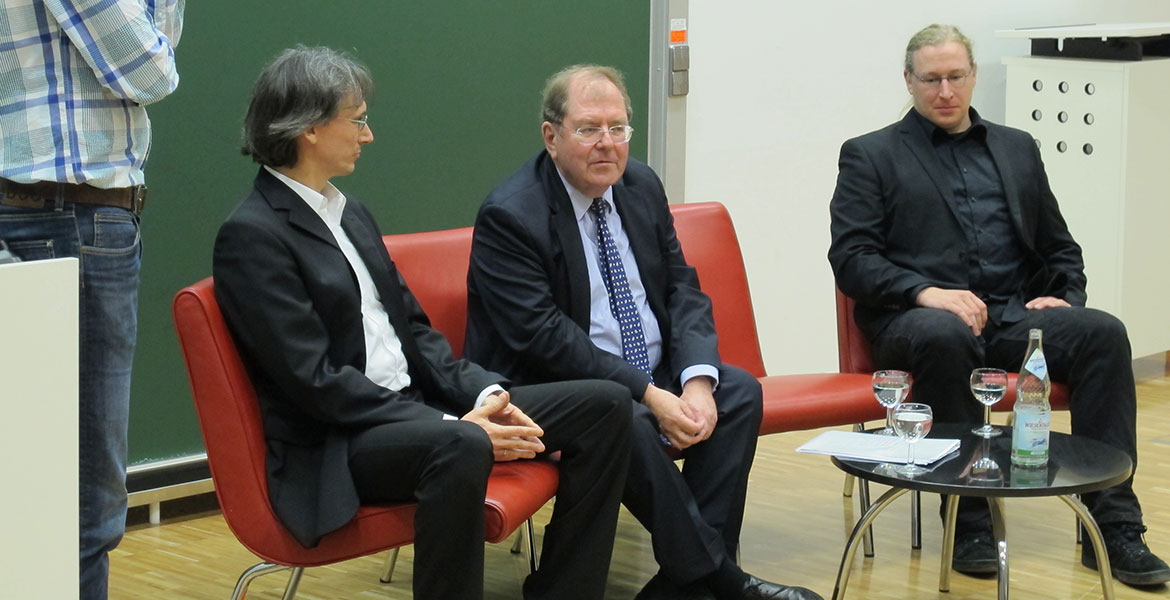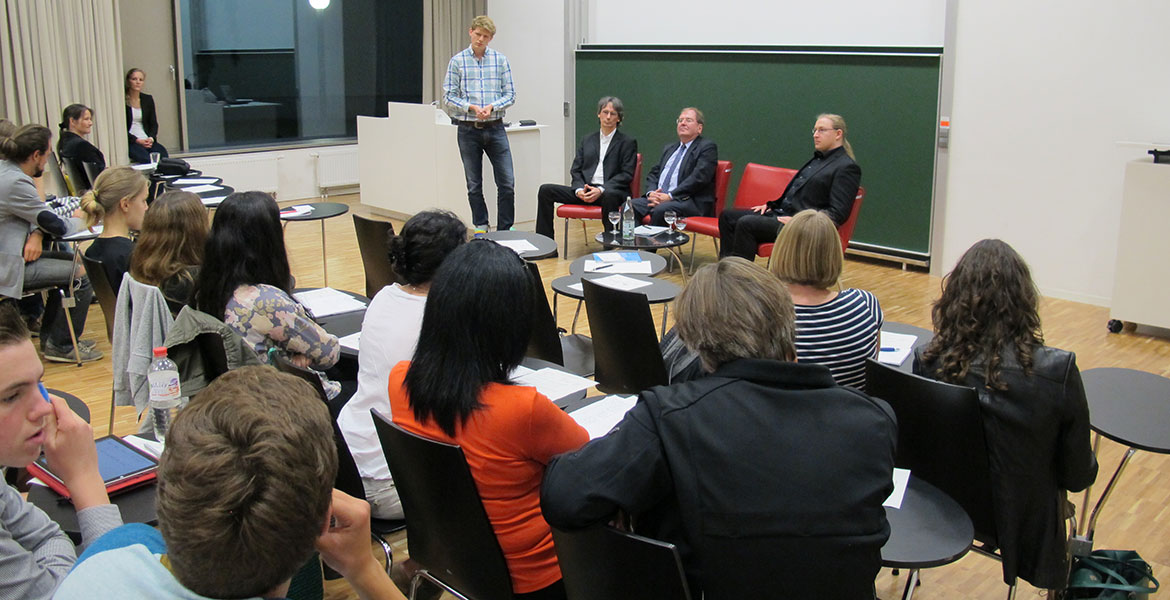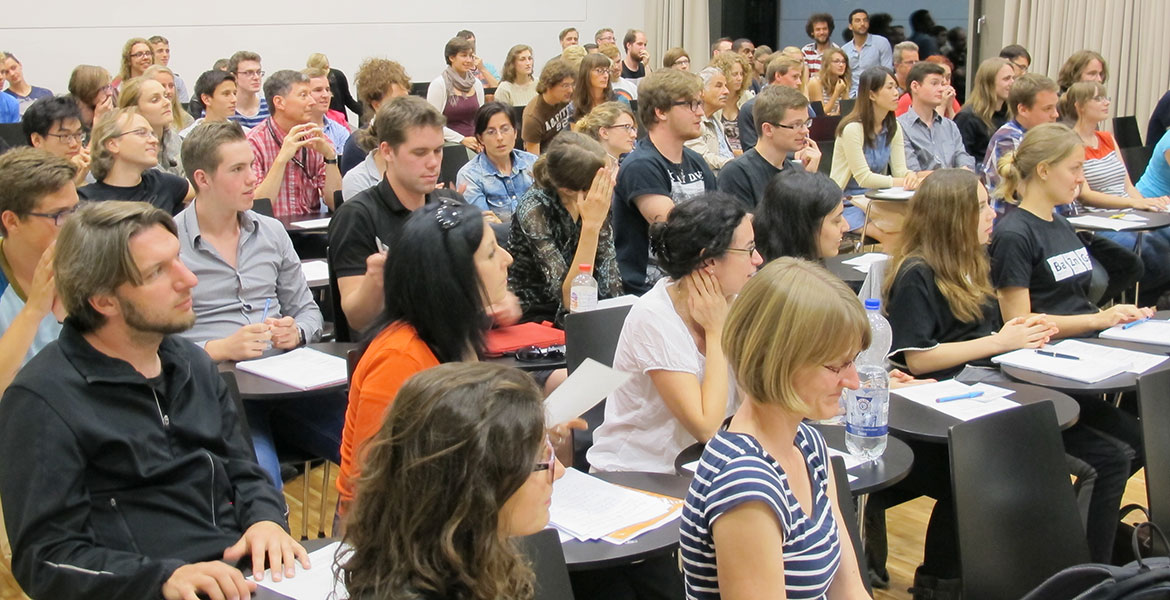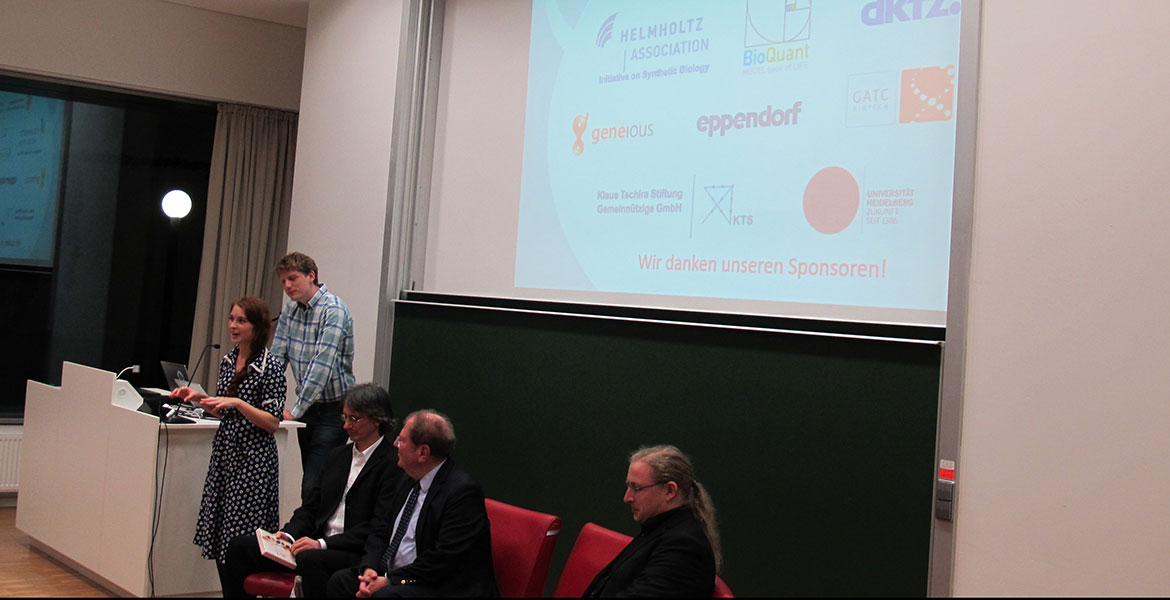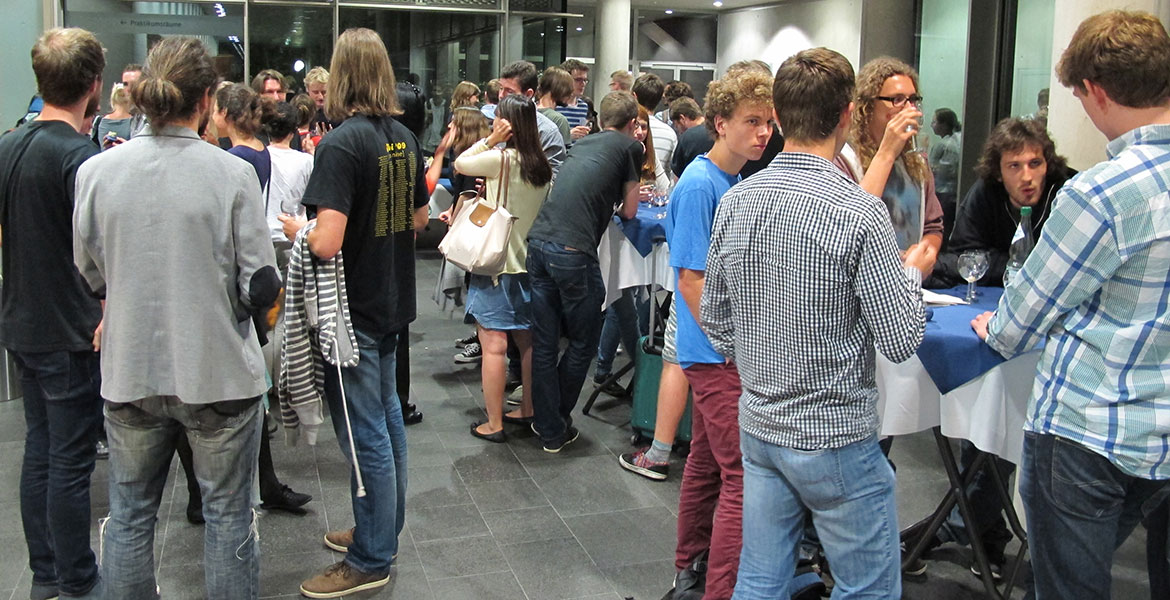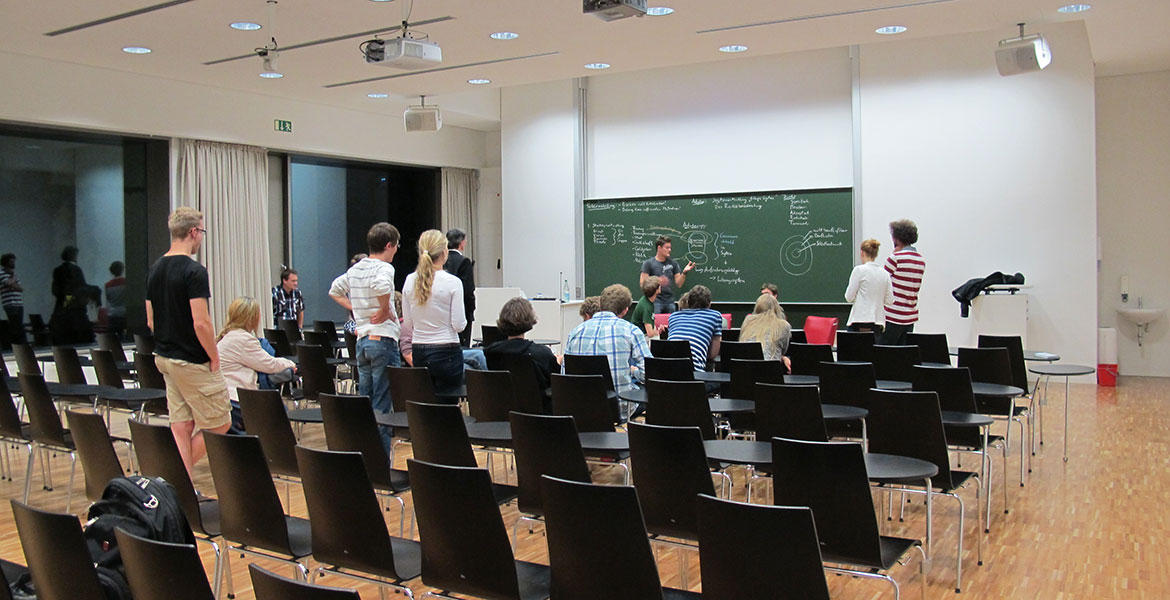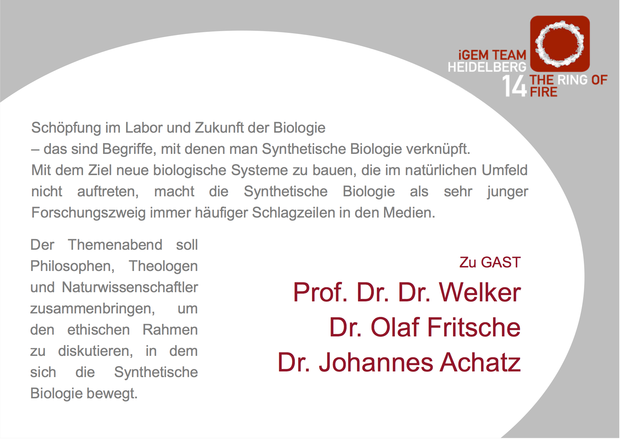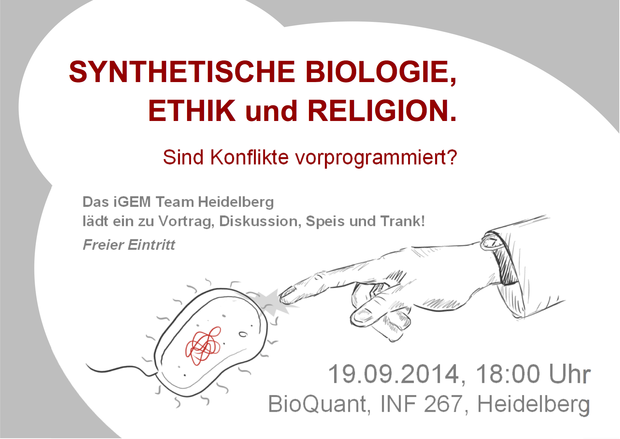Team:Heidelberg/pages/Ethics
From 2014.igem.org
| (17 intermediate revisions not shown) | |||
| Line 1: | Line 1: | ||
| + | As many synthetic biology projects possess the potential to introduce new biological systems into everyday life in the near future, we as an iGEM team see the importance to involve the society into discussion about this new field of research as early as possible. Therefore we organized an interdisciplinary theme evening addressing the question „Synthetic Biology and Religion – Are conflicts preprogrammed?“ | ||
| + | We invited three experts from the fields of ethics, biology and religion to give talks on the compatibility of moral norms in our society and current and future research in synthetic biology. | ||
| + | Afterwards, our audience consisting of other university and high school students, local residents and scientists, was invited to participate in a panel discussion. | ||
| + | |||
<html> | <html> | ||
<style type="text/css"> | <style type="text/css"> | ||
| Line 5: | Line 9: | ||
} | } | ||
</style> | </style> | ||
| - | <div class="col-lg-8 col-md-8 col-sm-12 col-xs-12 col-lg-offset-2 col-md-offset-2"> | + | |
| - | <div id="carousel-screensaver" class="carousel slide" data-ride="carousel"> | + | <style type="text/css"> |
| + | div.margin-top { margin-top: 25px; } | ||
| + | </style> | ||
| + | |||
| + | <div class="col-lg-8 col-md-8 col-sm-12 col-xs-12 col-lg-offset-2 col-md-offset-2" style="margin-top: 25px; margin-bottom: 25px;"> | ||
| + | <div style="border: #DE4230 5px solid" id="carousel-screensaver" class="carousel slide" data-ride="carousel"> | ||
<!-- Indicators --> | <!-- Indicators --> | ||
<ol class="carousel-indicators"> | <ol class="carousel-indicators"> | ||
| Line 23: | Line 32: | ||
<div class="carousel-inner"> | <div class="carousel-inner"> | ||
<div class="item active"> | <div class="item active"> | ||
| - | <a class="img-enlarge | + | <a class="img-enlarge " href="/wiki/images/8/8e/IMG_3125.jpg" target="_blank"><img src="/wiki/images/8/8e/IMG_3125.jpg" class="img-responsive" alt="Image"></a> |
</div> | </div> | ||
<div class="item"> | <div class="item"> | ||
| Line 64: | Line 73: | ||
</div> | </div> | ||
</div> | </div> | ||
| - | + | ||
| - | + | ||
| - | + | ||
</html> | </html> | ||
| + | ==The program in detail== | ||
| - | |||
| - | |||
| - | |||
| - | + | *'''Introduction into Synthetic Biology and iGEM''' – Magdalena Büschner from the iGEM team 2014 | |
| - | + | *'''About the value of life and the value of the 'software of life''' – Dr. Johannes Achatz, philosopher specialized on applied ethics and synthetic biology from Friedrich-Schiller University Jena | |
| - | *Introduction into Synthetic Biology and iGEM – Magdalena Büschner from the iGEM team 2014 | + | *'''Creation, evolution and the cultural mandate''' – Prof. Dr. Dr. Dres. h.c. Michael Welker, theology professor from Ruprecht-Karls University Heidelberg |
| - | *About the value of life and the value of the 'software of life' – Dr. Johannes Achatz, philosopher specialized on applied ethics and synthetic biology from Friedrich-Schiller University Jena | + | *'''Playing god? Who is responsible for the progress?''' - Dr. Olaf Fritsche, author, graduate in biophysics |
| - | *Creation, evolution and the cultural mandate – Prof. Dr. Dr. Dres. h.c. Michael Welker, theology professor from Ruprecht-Karls University Heidelberg | + | *'''Panel discussion''' – moderated by Sebastian Bock, student at Ruprecht-Karls University Heidelberg |
| - | *Playing god? Who is responsible for the progress? - Dr. Olaf Fritsche, author, graduate in biophysics | + | |
| - | *Panel discussion – moderated by Sebastian Bock, student at Ruprecht-Karls University Heidelberg | + | |
We decided to include a representative of a religious group into the discussion, as about three-quarters of the German population are members of a religious community, making these communities important social institutions. Interestingly, the evening showed that we should be able to reconcile the seeming conflicting interests of synthetic biology, ethics and religion: all three speakers agreed on the importance for human beings to take full responsibility of their actions, no matter if these individuals believe in a divine being or not. Another shared opinion was, that a constant dialogue between scientists and society, such as our theme evening, is essential for new scientific disciplines in order to get acceptance, but also critical feedback. There are plenty of efforts within synthetic biology to interact with society , which appears to be a good beginning. An important critical thesis during our event was that despite of its great potential to solve many of today's problems, we are unable to foresee possible risks synthetic biology bears, making regulation crucial. | We decided to include a representative of a religious group into the discussion, as about three-quarters of the German population are members of a religious community, making these communities important social institutions. Interestingly, the evening showed that we should be able to reconcile the seeming conflicting interests of synthetic biology, ethics and religion: all three speakers agreed on the importance for human beings to take full responsibility of their actions, no matter if these individuals believe in a divine being or not. Another shared opinion was, that a constant dialogue between scientists and society, such as our theme evening, is essential for new scientific disciplines in order to get acceptance, but also critical feedback. There are plenty of efforts within synthetic biology to interact with society , which appears to be a good beginning. An important critical thesis during our event was that despite of its great potential to solve many of today's problems, we are unable to foresee possible risks synthetic biology bears, making regulation crucial. | ||
| + | |||
Perhaps the most animated discussion arose when we touched upon the question of whether religious groups should be involved in the decision making process about regulation of synthetic biology or not, and if yes to what extent. It was stated that the German Ethics Council, the organ deciding such moral issues, is built in an undemocratic way. There are plenty of theologists, but politicians, teachers or many other working and social groups are not represented in this important council. | Perhaps the most animated discussion arose when we touched upon the question of whether religious groups should be involved in the decision making process about regulation of synthetic biology or not, and if yes to what extent. It was stated that the German Ethics Council, the organ deciding such moral issues, is built in an undemocratic way. There are plenty of theologists, but politicians, teachers or many other working and social groups are not represented in this important council. | ||
In summary, synthetic biology is a good example for a successful dialogue between science and society, still ethical decisions with political and juristic implications seem not to take all social groups into account. | In summary, synthetic biology is a good example for a successful dialogue between science and society, still ethical decisions with political and juristic implications seem not to take all social groups into account. | ||
| + | |||
We were happy to get financial support from the Helmholtz Initiative on Synthetic biology and Studienstiftung des Deutschen Volkes for this theme evening. | We were happy to get financial support from the Helmholtz Initiative on Synthetic biology and Studienstiftung des Deutschen Volkes for this theme evening. | ||
| + | |||
| + | Here you can see the flyer we used to advertise the theme evening: | ||
| + | |||
| + | {{:Team:Heidelberg/templates/image-half| align=right|descr=| | ||
| + | caption=back| file=flyer_ethics_back.png}} | ||
| + | {{:Team:Heidelberg/templates/image-half| align=right|descr=| | ||
| + | caption=front| file=flyer_ethics.png}} | ||
Latest revision as of 20:29, 15 October 2014
As many synthetic biology projects possess the potential to introduce new biological systems into everyday life in the near future, we as an iGEM team see the importance to involve the society into discussion about this new field of research as early as possible. Therefore we organized an interdisciplinary theme evening addressing the question „Synthetic Biology and Religion – Are conflicts preprogrammed?“ We invited three experts from the fields of ethics, biology and religion to give talks on the compatibility of moral norms in our society and current and future research in synthetic biology. Afterwards, our audience consisting of other university and high school students, local residents and scientists, was invited to participate in a panel discussion.
The program in detail
- Introduction into Synthetic Biology and iGEM – Magdalena Büschner from the iGEM team 2014
- About the value of life and the value of the 'software of life – Dr. Johannes Achatz, philosopher specialized on applied ethics and synthetic biology from Friedrich-Schiller University Jena
- Creation, evolution and the cultural mandate – Prof. Dr. Dr. Dres. h.c. Michael Welker, theology professor from Ruprecht-Karls University Heidelberg
- Playing god? Who is responsible for the progress? - Dr. Olaf Fritsche, author, graduate in biophysics
- Panel discussion – moderated by Sebastian Bock, student at Ruprecht-Karls University Heidelberg
We decided to include a representative of a religious group into the discussion, as about three-quarters of the German population are members of a religious community, making these communities important social institutions. Interestingly, the evening showed that we should be able to reconcile the seeming conflicting interests of synthetic biology, ethics and religion: all three speakers agreed on the importance for human beings to take full responsibility of their actions, no matter if these individuals believe in a divine being or not. Another shared opinion was, that a constant dialogue between scientists and society, such as our theme evening, is essential for new scientific disciplines in order to get acceptance, but also critical feedback. There are plenty of efforts within synthetic biology to interact with society , which appears to be a good beginning. An important critical thesis during our event was that despite of its great potential to solve many of today's problems, we are unable to foresee possible risks synthetic biology bears, making regulation crucial.
Perhaps the most animated discussion arose when we touched upon the question of whether religious groups should be involved in the decision making process about regulation of synthetic biology or not, and if yes to what extent. It was stated that the German Ethics Council, the organ deciding such moral issues, is built in an undemocratic way. There are plenty of theologists, but politicians, teachers or many other working and social groups are not represented in this important council. In summary, synthetic biology is a good example for a successful dialogue between science and society, still ethical decisions with political and juristic implications seem not to take all social groups into account.
We were happy to get financial support from the Helmholtz Initiative on Synthetic biology and Studienstiftung des Deutschen Volkes for this theme evening.
Here you can see the flyer we used to advertise the theme evening:
 "
"
